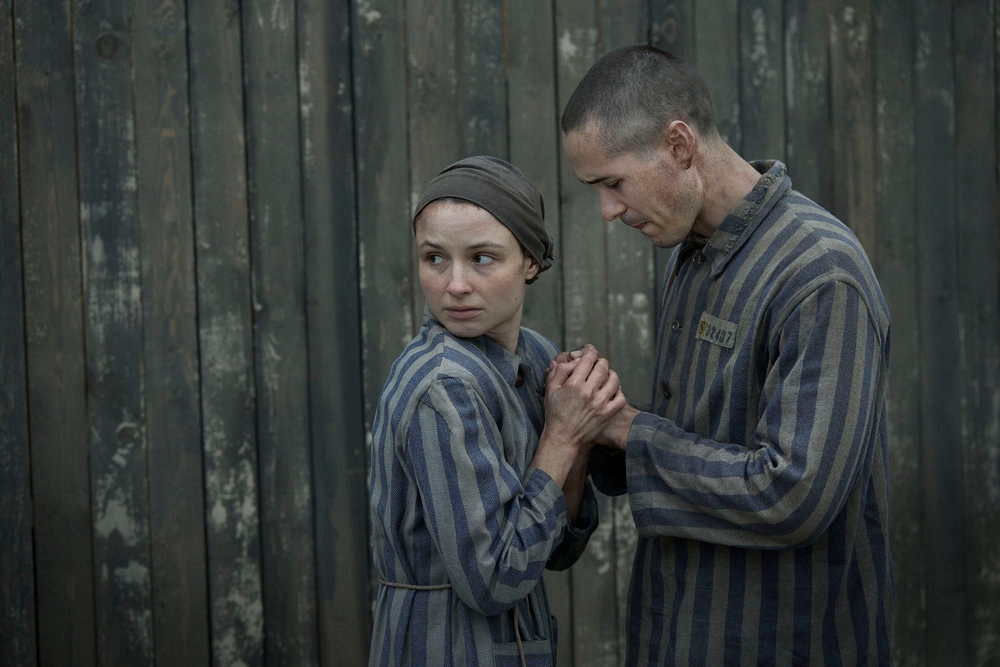Why Lorraine Hansberry Called Her Play ‘Up Yours, Edward Albee’

Image by Courtesy of The Goodman Theatre
Lorraine Hansberry, who died of pancreatic cancer at age 34, had two plays produced on Broadway in her lifetime. One was “A Raisin in the Sun,” her classic answer to the Langston Hughes question about a dream deferred. The New York Drama Critics Circle named “Raisin” the best American play of the 1958–59 season, and it became part of the canon. (Its two star-studded 21st-century revivals won a combined six Tony Awards.) The other was “The Sign in Sidney Brustein’s Window,” which eked out 100 performances in 1964 and 1965.
“Sidney Brustein,” set amid the folk-tinged, politically active, optimistic Greenwich Village bohemia of the early 1960s, is running in a much-praised revival at the Goodman Theatre, in Chicago. It is sharply, gorgeously directed by Anne Kauffman, played on an eye-catching set by Kevin Depinet and ably performed by an excellent cast. But even in this superlative production, it’s not hard to see why the play wasn’t a hit the first time around.
The focus is, of course, on Sidney (Chris Stack), a leftist and a ringleader, a self-styled intellectual who pontificates freely and has ulcers. As the play opens, he has just shuttered Waldon Pond, his folk nightclub — which he insists was not a nightclub, despite the bar glasses he has liberated to his apartment — and has instead acquired a Village Voice-like newspaper (with money he doesn’t have). He lives with his put-upon wife, Iris (Diane Davis), a purportedly Greek-Irish-Cherokee bohemian shiksa goddess analysand and aspiring actress, and several hangers-on, including a half-black friend named Alton (Travis A. Knight); David (Grant James Varjas), a gay experimental playwright who lives upstairs, and a local hepcat named Max (Phillip Edward Van Lear).[
Hansberry designed it as a portrait as a certain kind of world. “The corduroy-wearing, chukka-booted, Bergman-film-loving, non-cold-water-flat-living, New School lecture-attending, Washington Square concert-going, middle-class and usually Jewish argument-loving Greenwich Village intellectual has [rarely peopled our stage] in his full dimension,” she wrote in an essay that appeared in The New York Times in advance of the play’s opening (and is reprinted in the Goodman program). “It is my belief that ‘The Sign in Sidney Brustein’s Window’ fills in something of a genuine portion of that milieu.”
It’s a milieu into which she had some insight. From 1953 to 1964, she was married to Robert Nemiroff, a Jewish songwriter and political activist, and they lived together in the Village. When Iris yells at Sidney that she “doesn’t want to play Appalachian anymore,” and later confesses that “I guess I just tried to live up to your fantasy about me,” one wonders to what degree that roleplaying and exoticism factored into her own marriage. (Of course, Hansberry is also widely believed to have been a closeted lesbian; in 1999 she was inducted into the Chicago Gay and Lesbian Hall of Fame.) After their divorce, Nemiroff remained her literary executor.
The problem is that if this is a reliable portrait of that Greenwich Village Jewish milieu, the milieu was a tedious one. Sidney begins the play arguing for a sort of post-ideological stance, that his newspaper won’t take any political positions because it’s impossible to change anything, anyway. Soon enough he is convinced he can at least help change his own little neighborhood for the better, and he gets behind the anti-machine candidacy of his jolly friend Wally O’Hara (Guy Van Swearingen). (The titular sign in the window is for O’Hara.) Eventually, he learns that the victorious O’Hara was actually just a tool of the machine. He also learns that Iris’s older sister, Mavis (Miriam Silverman), an uptown matron, is actually in a loveless marriage of convenience. And he knows that her younger sister, pretty Gloria (Kristen Magee), is a call girl. Iris gets her hair professionally done to star in a commercial for a home perm. The discovery — a surprise to Sidney, and perhaps to Hansberry, though obvious to us — is that everyone turns to be a whore.
It’s an old-fashioned message play, and a heavy-handed one. That’s by design. The year 1964, when it ran on Broadway, was the year of “Funny Girl” and “Hello, Dolly.” “Who’s Afraid of Virginia Woolf?” ended its two-year run that May. Hansberry, a civil rights activist, found all that frothy entertainment and/or existential despair to be missing the point. An early draft of “Sidney Brustein” was subtitled “Up Yours, Ed Albee” (according to an essay in the program).
That’s the play’s failing, that it’s quite so transparently didactic. The characters feel less like people and more like types. The capital-M Message remains painfully obvious. And Sidney himself isn’t particularly fun to be around.
But despite its flaws, the play remains of historical interest, and Kauffman creates the richest possible version of the experience. Depinet’s set, especially, places a lived-in tenement apartment amid a superstructure of scaffolding supports so that we see the wings above, alongside and even below the playing space. It’s a powerful image of the tenuousness of life in that apartment, of its isolation, but perhaps also of everything outside that silently supports life within it. Stack is persuasive as the hectoring Sidney, and Davis makes an engagingly conflicted Iris. The best moments in the show come from Silverman as the elegant Mavis. She has the best lines, and the scene in which she reveals the corruption at the heart of her marriage is the play’s point in miniature, but Silverman plays the part with delicious, wised-up gusto. (Full disclosure: Her husband, the actor Adam Green, is a friend.)
The play’s final line is overly profound but also wise. “Tomorrow,” Sidney says to Iris, after everything has fallen apart, “we shall make something strong of this sorrow.” Kauffman and company have made something strong of a play that isn’t.
Jesse Oxfeld has written about theater for New York Magazine and Entertainment Weekly. Twitter, @joxfeld

I hope you appreciated this article. Before you go, I’d like to ask you to please support the Forward’s award-winning journalism this Passover.
In this age of misinformation, our work is needed like never before. We report on the news that matters most to American Jews, driven by truth, not ideology.
At a time when newsrooms are closing or cutting back, the Forward has removed its paywall. That means for the first time in our 126-year history, Forward journalism is free to everyone, everywhere. With an ongoing war, rising antisemitism, and a flood of disinformation that may affect the upcoming election, we believe that free and open access to Jewish journalism is imperative.
Readers like you make it all possible. Right now, we’re in the middle of our Passover Pledge Drive and we still need 300 people to step up and make a gift to sustain our trustworthy, independent journalism.
Make a gift of any size and become a Forward member today. You’ll support our mission to tell the American Jewish story fully and fairly.
— Rachel Fishman Feddersen, Publisher and CEO
Join our mission to tell the Jewish story fully and fairly.
Only 300 more gifts needed by April 30
























